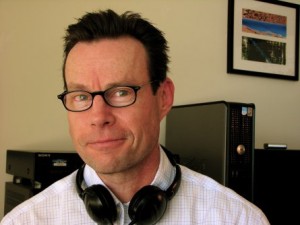#MediaMonday – Mike Lamp
Today’s #MediaMonday comes to us from Mike Lamp, morning host and news producer for Colorado Public Radio’s statewide news service, airing NPR and Colorado news from CPR’s studios in Denver. He moved to Colorado in 2000, from KNAU-FM, the NPR station in Flagstaff. He has to get up early. I first met Mike when we were both students in the School of Communication at NAU. He continued on the broadcast career path and I left Flagstaff to come back to Phoenix and join what was then known as Ed Moser & Associates (now HMA Public Relations). Mike is who suggested that, because of my writing ability, I “get one of those cushy PR jobs and write press releases all day.”
So, Mike, time to share!
What do you want to tell the blogosphere about yourself today?
The quick rundown of professional stops along the way to an unexpected outcome is this: Overnight DJ at KAFF-Country in Flagstaff (that goes back 30 years); news anchor at Flagstaff’s now-defunct KNAZ-TV (with sports anchor Scott Hanson); then producing at KTVK-TV in Phoenix, where I thought I broke up with broadcasting for good (it was me, not Channel 3). Some years away, then tentatively back to a part-time thing at KPHO-TV in Phoenix, then to public radio which maybe what was waiting for me all along. A nice start at KNAU-FM, then these past 12 years in Denver where I guess I have to admit it’s become a regular gig.
And what strikes me just now is something which has stayed true through all of those moves, which is that it’s still possible to be surprised. And that element of surprise, something just a bit unexpected, is often behind the best work we ever put on the air.
The latest example is just recently, while we were having some big wildfires burning in Colorado. I spent a few minutes on the phone with the Chief of the U.S. Forest Service, Tom Tidwell. And I asked him the obvious questions about the official response to our fires, and got the appropriate answers, and it was a perfectly respectable interview. And before hanging up, I casually asked him, what was his history with the Forest Service? And it turns out he started on a forest fire crew. Talk about the ground floor! He knew what it was like in the dirt and smoke and heat. And that to me was the most interesting part of the conversation, after I had covered all the necessary newsy questions and asked him one thing about himself.
Those are always my favorite interviews, when you can produce something that lets the audience hear the news, and also learn something about the guest, and hear that humanity that people bring to whatever stories they’re involved in.
Another memorable one was with a Christian aid worker, who survived the earthquake in Haiti in 2010. Buried alive, for days, in almost total darkness, and finally pulled to safety. And we heard all the facts about his being rescued. But what you remember is the gravity and dignity of his telling it. The awe at his being spared, and his conviction that of course he was going back to Haiti, where his work was something to be admired.
I guess news gathering is a lot different than it used to be, but it’s the equipment that’s changed the most — I think the attitudes and motivations behind producing the news are pretty constant. We can reach people anywhere on their cell phones now, and stream our radio signal on the web, and edit scripts and audio files in seconds, and our recording kits really don’t weigh as much as they used to. We post news updates on Facebook. But like they did decades ago, we’re still trying to get the news out as fast as we can, clearly and accurately, and with some context behind the raw information.
In an announcing class at NAU, a teacher told me I read my copy too fast. That I’d never make it in broadcasting if I didn’t correct that. I think my whole career has pretty much been applying that one lesson. To slow down, and try to make myself understood. And I’m still trying. Cheers.

